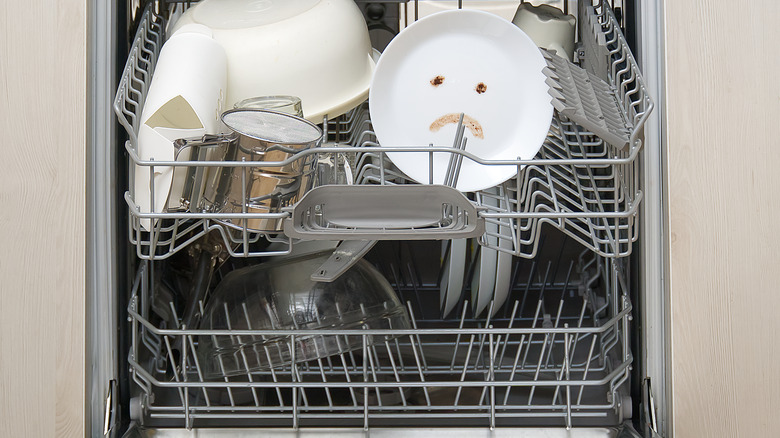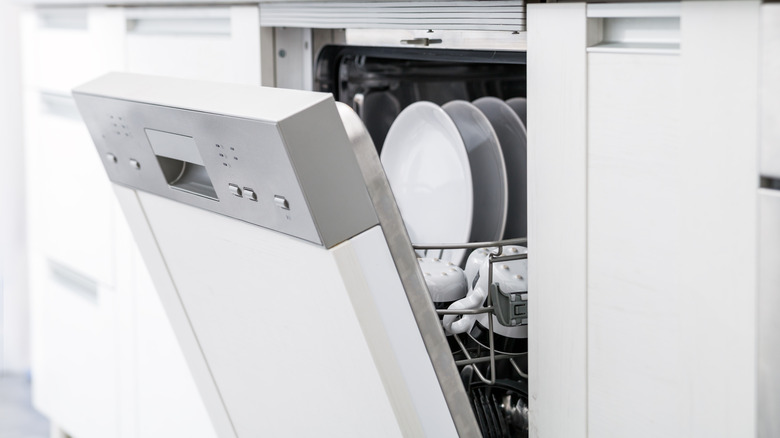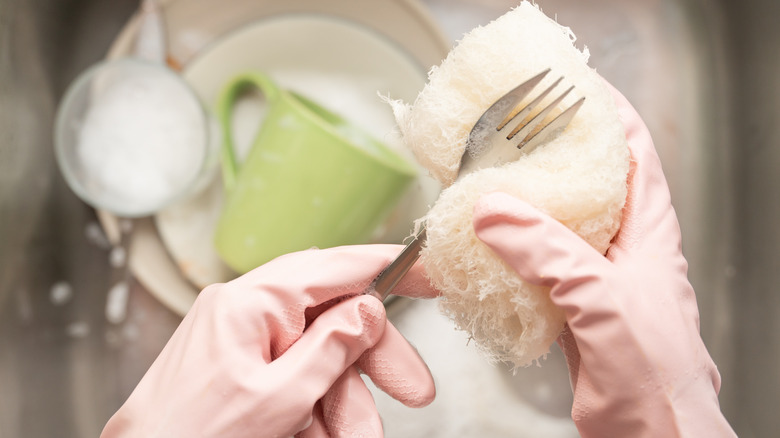Why Your Dishwasher Is Leaving Brown Stains On Your Cookware
We may receive a commission on purchases made from links.
Life with a dishwasher is better than life without one. They can cut chore time dramatically and are three to four times more efficient than washing a standard load of dishes by hand, per Green Choices. But your dishwasher can malfunction or suffer damage even with all its benefits. From busted propellers to moldy filters (be sure to check these often) and even those pesky hard water stains, dishwashers can have a myriad of issues. But what does it mean if your dishes come out of the dishwasher with brown stains?
The good news is that it doesn't mean your dishwasher has given up or lost its ability to clean properly. Those stains aren't even the result of food or grime. Brown, red, or tan streaks and marks on your dishes may mean you have excess iron in your water supply. Luckily, this isn't the end of your dishwasher, and your dishes can be cleaned again.
What do iron stains mean?
Just like limescale results from calcium in your water, brown stains come from iron. Wondering why you don't have red or brown water coming out of your water tap? That's because the pigmentation results from oxidization, which creates our good friend rust, says Zanussi. If you've ever noticed a red ring or streak on your toilet bowl, it's the same phenomenon. Staining typically occurs if an item's barrier has been broken down, like from scratches or rough, sustained use. But Zanussi also notes that there is such a thing as floating rust, and it can settle on any of your dishes, even if they're brand new.
The good news is this is an easy fix. You just started seeing the brown stains because of a concentrated iron buildup in your dishwasher. Whirlpool recommends using a dishwasher cleaner like Afresh, which is available online or at most grocery and hardware stores. This is an excellent task to make a regular habit since these cleaners can help break down grease, grime, solid food particles, and other mineral buildups and keep your appliance running happily.
Are my dishes ruined now?
Luckily, your dishes are not permanently ruined or stained. Getting rid of iron stains requires an acidic solution — that gives you a few options between products or homemade cleaners. Unlike bleach-based cleansers like Comet, acidic cleansers are better at breaking down mineral deposits, says Bar Keeper's Friend. Bar Keeper's Friend is a chemical cleaning product in concentrated powder or diluted liquid forms. Both are great at polishing dishes and removing iron streaks. It is filled with tiny abrasives that help break down the deposits without scratching your dishes.
If you prefer a homemade solution, SPUD recommends reaching for vinegar. Distilled white vinegar is a widely available and affordable, highly acidic product, so be sure not to leave your skin exposed for long periods. If you want a lightly abrasive element, baking soda is another household product that can help remove rust. If you mix it with vinegar, you will get a bubbling reaction. To avoid this, mix the baking soda with water or dish soap.


